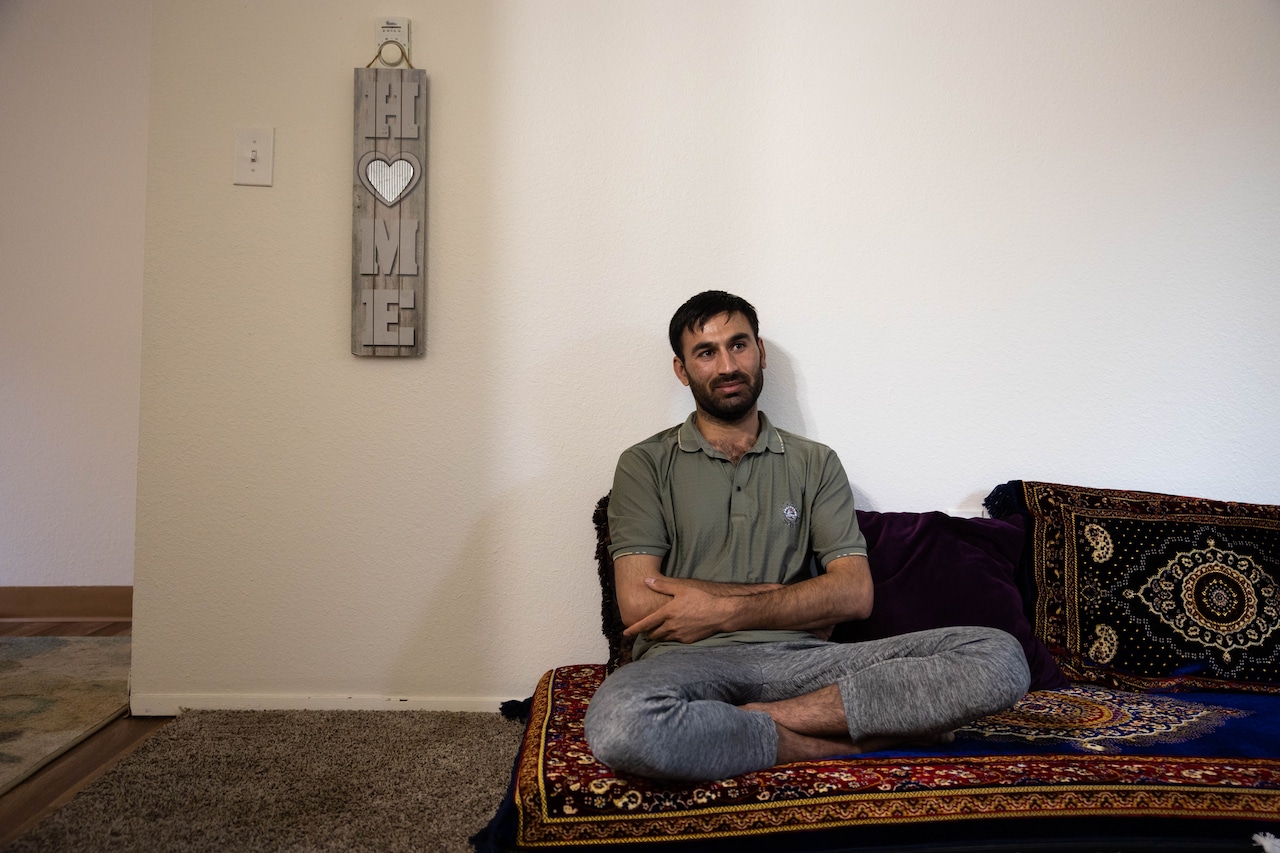
Obaidullah Baraty sits on a colorful toshak with his legs crossed in the almost empty living room of his Beaverton apartment as he shows pictures on his phone of his wife and baby boy.
The couple are from Faryab province in northern Afghanistan near the border with Turkmenistan, but their first child was born here as they build a life in their new Oregon home.
They arrived at Portland International Airport on March 3 with only two suitcases and a zeal for starting over.
Baraty’s family is among the hundreds of Afghan families that No One Left Behind was able to fly to the U.S. since President Donald Trump’s executive order paused flights and funding for refugees in late January, said Amanda Kim, communications director for the organization.
No One Left Behind helps evacuate former U.S. government interpreters and employees in Afghanistan and Iraq who are eligible for special immigrant visas.
It has secured flights for 2,673 Afghans and Iraqis since the executive order, including 180 people in 28 families flown to Oregon, Kim said.
“The situation in Afghanistan is not very good these days,” Baraty, 26, said through an interpreter. He is from the Uzbek ethnic group and speaks his native Uzbek and Dari, the form of Persian spoken in Afghanistan.
Baraty was a warehouse inventory worker at the U.S. Embassy in Kabul for two years before 2021, when the Taliban recaptured the country after the chaotic U.S. exit. While some Afghan families were able to evacuate, many others, including Baraty and his wife, were left behind.
Baraty said he wanted to leave the country, but he struggled with applying and paying for a visa. Around fall 2024, the couple relocated to Pakistan, where they lived for about six months before resettling in Oregon.
Because Afghanistan no longer has a U.S. Embassy, special immigrant visa holders like Baraty typically must go to a country with a U.S. Embassy that can process their visas.
Baraty’s wife, Barna Big, was about five months’ pregnant when the couple flew to Oregon. The two, who have been married about five years, welcomed son Abadullh Baraty on July 1.
One of the motivations to move here was to be able to raise Abadhullh and any other children they may have in a country with educational opportunities, he said.
Baraty had seen his nieces and nephews no longer able to attend school after the fall of Kabul, ending a 20-year U.S. presence and military intervention that began soon after the 9/11 terrorist attacks.
After their arrival, the couple stayed in a hotel for two weeks and then moved into the Beaverton apartment with the help of the Afghan Support Network based in Beaverton.
Darwaish Zakhil, a co-founder of the Afghan Support Network, said No One Left Behind reached out to his organization early this year and asked if it could help families find a place to live.
The network initially agreed to resettle 10 families, including Baraty. It later helped more.
The Afghan Support Network assigned a caseworker to Baraty and Big and has connected them with various resources, such as enrolling them in the Oregon Health Plan, especially because they were expecting a baby, coordinated doctor appointments, helped them pay for utilities and got them a cellphone.
In mid-August, the caseworker visited to help Baraty set up a TV and Wi-Fi. The TV is among the few items that stand in the family’s living room.
The Afghan Support Network also helped Baraty with English classes and to study to get his Oregon driver’s license. He then borrowed $3,300 from a man who runs an Afghan-Indian food cart in downtown Portland to buy a car.
With a job at the Amazon warehouse in Woodburn, Baraty said he was able to pay back the money he borrowed in two months.
The network helps families from three months to a year, depending on their needs and what assistance is available, Zakhil said. Baraty’s family will receive rental and case management help for a year, he said.
Almost all the families the Afghan Support Network helped resettle this year in Oregon are already on their feet, he said, with only one or two families still searching for work.
The organization has grown from one to 22 employees since it began in 2021 and has helped more than 2,000 households throughout the state, he said.
But federal funding freezes have affected its finances, Zakhil said. The organization has lost more than $1 million in federal funding, he said. Some of the money helped pay for caseworker salaries, he said.
The network also pulls funding from local grants and community donations.
“Internally, we are struggling to keep up,” Zakhil said. “As we try to find ways to help the community, we’re also trying to find ways to help bring funding. But it’s very challenging.”
And more Afghan families will likely make Oregon their home in coming months, said Kim of No One Left Behind.
“We are continuing to book flights for travel-ready SIV (special immigrant visa) holders and continue to partner with community organizations to resettle families, so it is very possible we continue to fly families to Oregon,” she said.
In his living room on a recent rainy morning, Baraty smiled as he said he’s now learning to be an Afghan American father. He’s the youngest of eight siblings and the only family he has in the U.S. is a sister and her husband who also live in Beaverton.
As he waited for Big and Abadullh to return from a visit to his sister’s house, he said they hope to have more kids but for now their first child has already made their apartment feel happy and comfortable.
He took his phone out and scrolled to a picture of his son sleeping in a car seat wearing a light blue beanie and covered with a blanket. As he spoke, the only decoration in the family’s living room hung on the wall to his left.
The gray sign says “home,” with a heart replacing the letter o.



